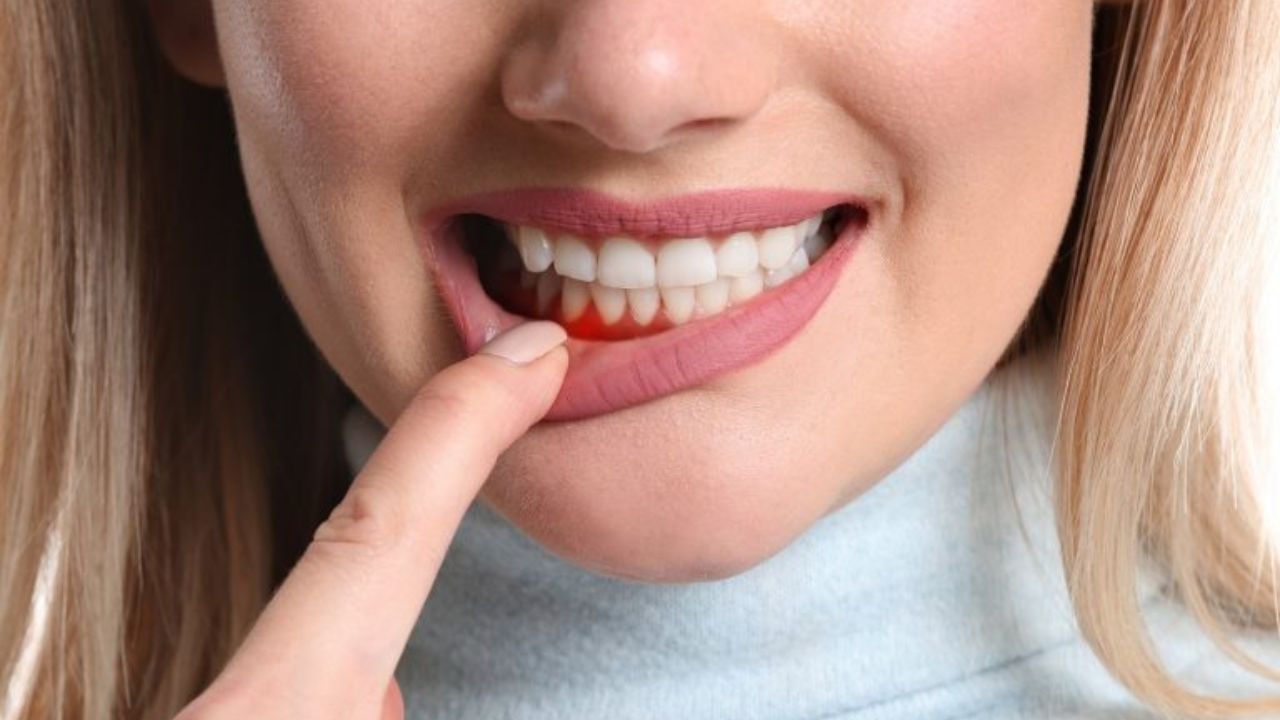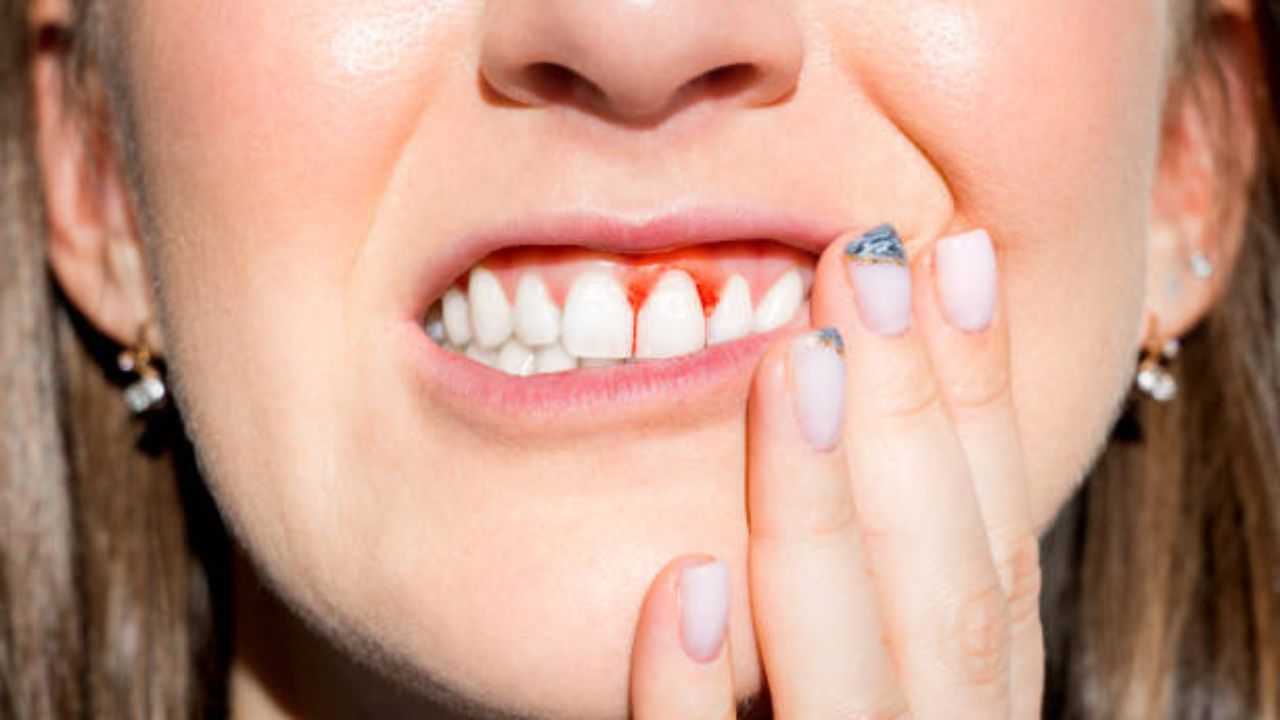What color are your gums when you look in the mirror? They are naturally pink and fit snugly against the teeth, giving bacteria little chance of colonizing and forming plaque. Inflamed gums can have many causes and lead to painful problems such as recession or even inflammation, also known as gingivitis and, in advanced stages, periodontitis. It is important to take good care of them to maintain healthy teeth. Below you will learn more about the various causes and how to get rid of gingivitis?
What is gingivitis?
When it is inflamed, there are more bacteria in the mouth than normal. It is important to take action early to prevent further problems. Various symptoms, which are explained below, can indicate problems. With the right care products, you can prevent inflammation and sensitivity and work towards healthy teeth.
Symptoms of inflamed gums
Blood after brushing or flossing your teeth
Have you ever noticed blood between your teeth after brushing or flossing? Blood when brushing or flossing indicates irritation and possibly the beginning of an infection. Healthy teeth almost never bleed.
Swollen
Are your tooth necks swollen? This swelling can be a symptom of inflammation.
Loose gums
Are your gums still tight around your teeth, or have they become loose? If the gums are no longer tight around the teeth, bacteria have the opportunity to colonize these spaces.
Pain and sensitivity
Do your teeth hurt if you touch them lightly? Check if there are any sharp bits of food left behind. If not, you should take action.
Causes of irritated gums
Inflammation is usually caused by poor oral hygiene or by bacteria, plaque, and food particles getting lodged under the gum tissue. In addition, the following things contribute to potential problems.
- Poor oral hygiene can cause inflamed gums
It is important to brush and floss your teeth daily to prevent plaque. If not properly stored, food particles, plaque, and other bacteria can irritate them.
- Brushing too hard can cause inflamed gums
Using a toothbrush that’s too hard or brushing too hard can cause toothbrushing trauma, leading to irritation and withdrawal symptoms. That’s why it’s important not to apply too much pressure when brushing.
- Inflammation can cause inflamed gums
When you suffer from it, there are more bacteria in your mouth that can cause pain.
- Unhealthy diet can cause inflamed gums
A healthy diet is important for maintaining healthy teeth. Sugar is a source of plaque-causing bacteria. Consuming many sugary drinks and foods can irritate them.
The difference between sensitive gums, gingivitis and periodontitis
Sensitive and painful gums can be the initial stage of inflammation (gingivitis). The cause is often bacteria, brushing your teeth too hard or damage caused by a toothpick. The difference between gingivitis and periodontitis is that gingivitis means inflammation, which in advanced stages can lead to periodontitis, i.e. severe inflammation. Gingivitis can often be resolved at home with improved oral hygiene and regular tooth brushing. If you neglect this stage, the disease can spread to the jawbone because the gums have receded so much. This can lead to loosening of the teeth, with all the associated consequences. It is therefore important to address the problems early on.
What does the color of your gums say about your health?
Color can say a lot about your overall health. Below you will learn more about the meaning of the different colors.
Pink gums
Gums are usually pink, but in dark-skinned people they can be more brown or purple due to the pigment they contain.
Red gums or inflamed gums
If it is bright red, this indicates inflammation. These include tenderness or pain to touch, cold or heat, and spontaneous bleeding when brushing teeth.
A white or pale color may indicate a fungus, Candida albicans. This can be caused by poor oral hygiene or reduced resistance.
White dots
Do you have a white spot or multiple spots? If they are red in color, this could be a sign of aphthous ulcers in your mouth. These are small painful sores in the mouth that can be caused by minor wounds or a vitamin deficiency.
Black gums
Black discoloration is rare, it can be a sign of dying flesh or bleeding from dental surgery.
How to get rid of gingivitis?

Here are 5 steps you can take to improve the condition of your teeth. Are you wondering what you can do to get rid of gingivitis? Read the following tips and tools to take better care of your teeth.
Getting rid of the root cause often helps with bad breath, but what about in the meantime? There are many things you can do at home to freshen your breath, much of it in the kitchen, without the need for pills or expensive gadgets.
Use mouthwash to combat bad breath from gingivitis
Mouthwash can do wonders for removing harmful bacteria in your mouth and freshening your breath. Don’t like the store version? Ask your trusted dentist for the recommended brands.
Regularly brush your teeth to destroy bacteria that cause gingivitis
Keeping your teeth perfectly clean will help eliminate the odor and bacteria that cause gingivitis. Dentists recommend that you brush your teeth after every meal. If that sounds like too much, try developing it. Go from brushing your teeth daily to twice a day, then the next few weeks add a third time, etc.
- Floss daily.
- Keep a travel size toothbrush in your bag or at work.
- Switch to softer bristles while your gums get used to more brushing.
Chew foods that benefit your teeth
Chewing foods like apples, celery, or gum helps remove food debris and plaque from teeth. It can also make your breath smell fruity and pleasant. If you love to chew gum, make sure it’s a sugar-free brand.
Drink water to rinse bacteria out of your mouth
Water literally flushes the bacteria that cause gingivitis out of your mouth. It’s also linked to numerous health benefits, from clear skin to better concentration and appetite control. With so many good reasons to stay hydrated, there’s no reason to skip eight glasses a day.
Natural remedies for bad breath
The kitchen can be an endless source of natural breath remedies. Here are some herbs and other ingredients you can try:
- Sage has been used as a powerful anti-inflammatory for centuries and can help treat gingivitis. Try rubbing fresh crushed leaves or the powdered version on the infected areas of your gums. Leave it on for a few minutes and rinse it off if your mouth becomes irritated.
- Turmeric is a powerful antimicrobial spice, used for centuries in traditional Indian health cures. The old method is to make a paste of turmeric and water and brush with it. For a more modern take, simply eat more delicious foods like curry.
Prevention
To prevent gingivitis from occurring in the first place, it is important to pay attention to thorough oral hygiene and to go to the dentist regularly for check-ups. In this way, gingivitis can be prevented or detected and treated at an early stage.
As a preventative measure, it is also advisable to have your teeth professionally cleaned at least once a year by your dentist. Because this also reaches the places in the mouth that you cannot reach with the toothbrush.
Summary
The natural color of your teeth is pink, although there may be some color differences. Bleeding gums are the result of inflammation of the gums. This is often caused by the presence of plaque and bacteria in the mouth, as well as poor oral hygiene and hard brushing. It is important to take timely action. It can be prevented by brushing and flossing your teeth every day and visiting the dentist every six months.
Frequently asked questions
What is gingivitis?
Inflammation of the gums is also known as gingivitis. It is caused by plaque and bacteria and can be seen by blood when brushing or flossing your teeth. It may also be irritated, red, or swollen.
What Causes Inflamed Gums?
Inflammation is usually caused by plaque and bacteria in the mouth. If not removed, they can become irritated and painful.
How to get rid of gingivitis?
You can remedy this by improving your oral hygiene; it is important to use a toothbrush and floss daily. It is also important not to brush too hard with the toothbrush and to visit the dentist every six months.
